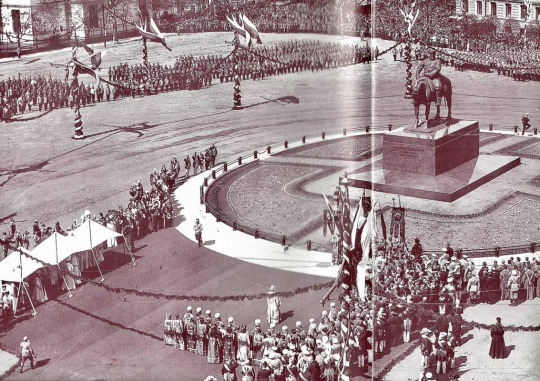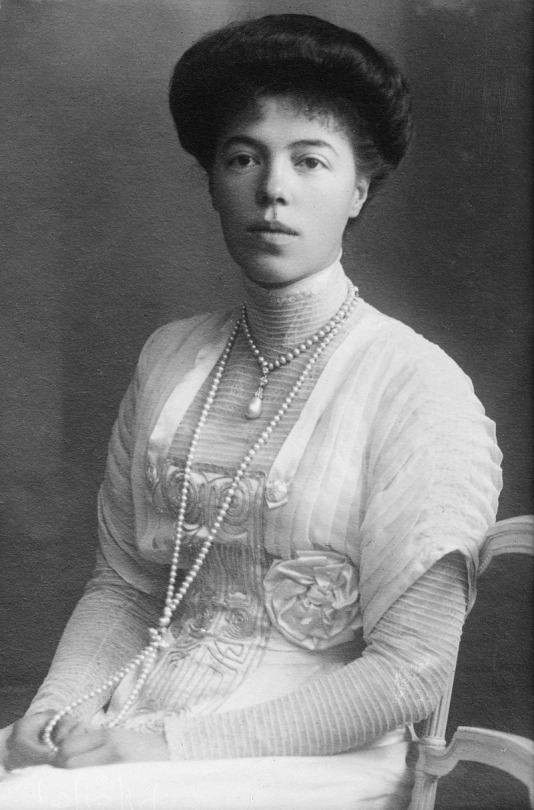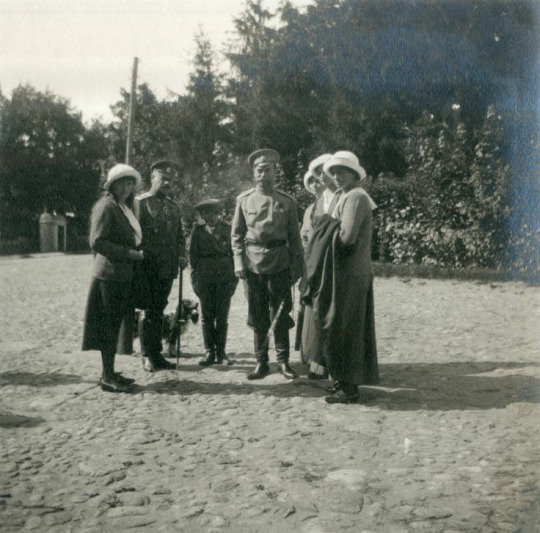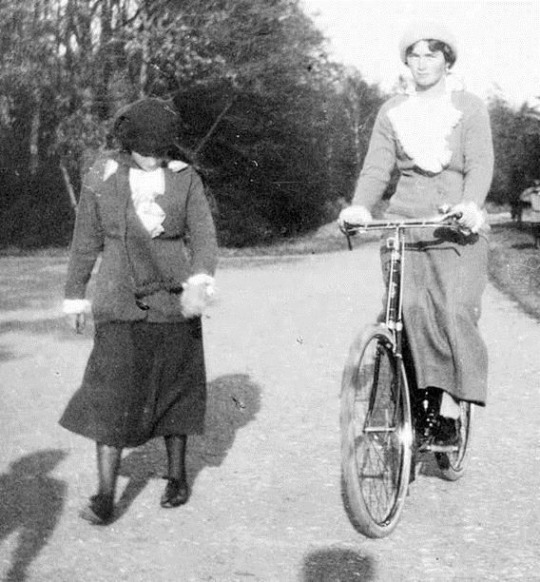#Tsarist history
Explore tagged Tumblr posts
Text
Previously unseen photograph of Nicholas II and Alexandra Feodorovna


Smiling on the Standart Yacht. Found (as always!) by Ilia, LastRomanovs on Flickr from the GARF archives
90 notes
·
View notes
Text

Trubetskoi's bronze equestrian statue of Tsar Alexander III, unveiled in 1909 (photo of ceremony above). Public opinion on the statue was conflicted - notably Grand Duke Vladimir Alexandrovich (Tsar Alexander III's brother) disapproved. Tsar Nicholas II however, did not see the statue as a caricature or symbol of the autocracy's inertia, but as a representation of power.

The statue was removed in 1937, but in 1994 was relocated to the courtyard of the Marble Palace.
#Russian History#Tsarist History#Tsar Nicholas II#Tsar Alexander III#Grand Duke Vladimir Alexandrovich#Art#Art History
2 notes
·
View notes
Text

Image: IWM (Q 77992) Russian soldiers standing beside a Putilov-Austin armoured car during the fighting in Romania, 1916.1917.
40 notes
·
View notes
Text

Olga Nikolaevna
Round/oval face shape
Kind eyes
Thin lips
Broader forehead
Small nose

Tatiana Nikolaevna
Cat like eyes
More soft but chiseled features
Thin lips
Slightly pointy chin
Straight nose

Maria Nikolaevna
Round/oval face
Huge round eyes (Mashka’s saucers)
Thick lips
Chubby
Small and slightly upturned nose
Strong and thick eye brows

Anastasia Nikolaevna
Long nose
Thin lips
Small eyes
Long face
Obvious fringe
Eyes seem to be laughing

Alexei Nikolaevich
Visibly the youngest
Obviously Alexei
#russian history#tsarist russia#olga nikolaevna#tatiana nikolaevna#maria nikolaevna#anastasia nikolaevna#alexei nikolaevich#otmaa#for anyone who can’t tell them apart
51 notes
·
View notes
Text

The famous image of Grand Duchess Anatasia Romanov. The reason I put here on my Byzantine blog is because Russia was considered to be the heir to the Second Rome, being the Second Roman Empire.
#byzantine#orthodox#tsarist russia#russian#russian empire#anastasia romanov#history#russian history#romanovs
15 notes
·
View notes
Text
it annoys me that in the overture for the anastasia musical, her grandmother sings the words to "once upon a december"
the whole point of that song is that she doesn't remember more than the tune! the words are about her vague memories of her childhood! it makes no sense for her grandmother to sing them!
#it's not like they would have needed to write something new; the movie has different words for the beginning#anyway something reminded me of this show this week#also i maintain that the plot from the movie with zombie rasputin > 'russian soldier with a crush and daddy issues'#no one ever thought the animated movie had anything to do with actual history and they should have kept it that way#although the nyt reviewer who said the show was 'tsarist propaganda' was pretty funny
2 notes
·
View notes
Text

“Leo Kohan-Berenstein, a Jewish student in the University of Dorpat, sent to eastern Siberia by administrative process (for helping a runaway political exile to escape) and then hanged from his hospital bed in Yakutsk upon the charge of resisting the authorities”
#history#prisoner#tsarist russia#political prisoners#russia#siberia#yakutsk#1920s#jewish#note they didn’t specify the identities or ethnicities of pretty much anyone else in the album#hmm wonder why
2 notes
·
View notes
Text

These mushrooms most giant Grow hidden from sight, They fit well in one's hand and they're quite Delicious with sour cream.
10 notes
·
View notes
Text

(Photo from the Romanovs' 1903 ball at the Winter Palace)
"Three perceived principles of Muscovite tsardom appealed to the Romanovs in their final years. The first was the notion of patrimonialism whereby the Tsar was deemed literally to own the whole of Russia as his private fiefdom (votchina) in the manner of a medieval lord. ...
The second principle of Muscovy was the idea of personal rule: as the embodiment of God on earth, the Tsar's will should be unrestrained by laws or bureaucracy and he should be left to rule the country according to his own consciousness of duty and right. ...
Lastly, there was the idea of a mystical union between the Tsar and the Orthodox people, who loved and obeyed him as a father and a god. It was a fantasy of paternal rule, of a golden age of popular autocracy, free from the complications of a modern state."
Figes, Orlando. A People’s Tragedy: The Russian Revolution 1891-1924. The Bodley Head, 2017.
#Romanov#Romanovs#The Romanovs#Romanov tercentennial#Nicholas II#Tsar Nicholas II#Alexandra Feodorovna#Russian History#Imperial Russia#Russian Imperial Family#Tsarist Russia
5 notes
·
View notes
Text


Me visiting the grave of the last duchess of Russia.
Я посещаю могилу Ольги, последней великой княгини Российской.
#Russia#toronto#russian empire#Russian history#tsarist russia#россия#российская империя#olega or Russia#romanov family#Romanov#orthodoxy#russian orthodox church
5 notes
·
View notes
Link
The Russians are staying put
1 note
·
View note
Text


Peter the Great and Tsar Nicholas II
There were two opposing models of autocracy in Russia: the Petrine and the Muscovite. Emulating Western absolutism, the Petrine model sought to systematize the power of the crown through legal norms and bureaucratic institutions. This was deemed a limitation on the Tsar's powers in that even he would henceforth be obliged to obey his own laws. The Tsar who did not was a despot. The Petrine tradition also implied a shift in the focus of power from the divine person of the Tsar to the abstract concept of the autocratic state. ... Nicholas[II]'s model of the autocracy was almost entirely Muscovite.
A People's Tragedy: The Russian Revolution, 1891–1924 by Orlando Figes
#Peter the Great#Tsar Nicholas II#Russian history#Tsarist history#history#The Petrine state#autocracy
3 notes
·
View notes
Text

Officer of the Russian Armoured Car Division talking to a wounded Russian soldier while his servicemen trying to recover their Lanchester armoured car bogged down in mud in Galicia (the Austro-Hungarian partition of Poland) while retreating during the Kerensky Offensive, summer 1917.
12 notes
·
View notes
Text
The heights of the Romanov Family






Height (in order of tallest to shortest)
Tatiana- 175cm (5ft 8/5ft9)
Maria 172cm (5ft 7/5ft8)
Tsar Nicholas II 170cm (5ft6)
Alexandra 170cm (5ft6)
Alexei 168cm (5ft6)
Olga 165cm (5ft 4 /5ft5)
Anastasia 157cm (5ft 1 /5ft2)
#russian history#tsarist russia#tatiana nikolaevna#maria nikolaevna#olga nikolaevna#anastasia romanov#alexei nikolaevich#alexandra feodorovna#romanov#otma#height check
68 notes
·
View notes
Video
youtube
Ha, I found it! This is Paul Robeson singing a Polish communist revolutionary anthem.
#the video description & the accompanying slideshow are... well. rather misleading (and obviously biased).#it was written in 1879 & so it had nothing to do with the actual bolshevik revolution#(apart from its obvious anti-tsarist sentiments that is);#it is - however - firmly rooted in the polish socialist tradition! which is fascinating in its own right#& doesn't merely serve as a footnote in the history of the russian revolution.#(although it should be also mentioned that a version with modified lyrics - omitting any mention of warsaw - /was/#indeed to become somewhat popular in the ussr in the 1930s.)
52 notes
·
View notes
Text
The most extreme minority of the already far-right Republican party used a crisis that they manufactured to bully the rest of the party to elect a fascist as Speaker of the House (the second-in-line to the Presidency after the Vice President)
This is textbook authoritarian takeover. Straight out of the history books. Happened in post-Tsarist Russia and more relevant to the GOP, in Weimar Germany.
3K notes
·
View notes